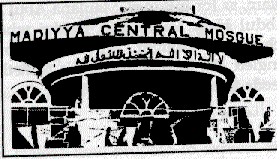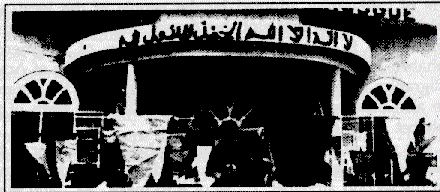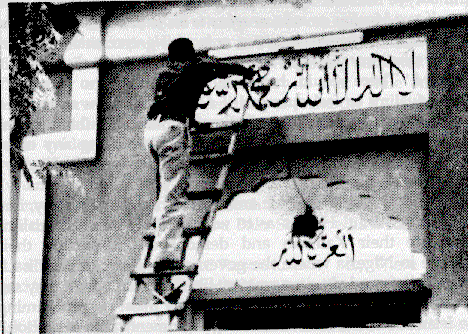CHAPTER SIX
ALTERATION OF KALIMAH
Abdul Hafeez also accuses the Ahmadiyya Muslim Community of altering
Islamic fundamentals and the first allegation he makes is in relation to
the Islamic credo, the Kalimah:
Laa 'ilaaha 'il-lal-laah Muhammadur-Rasuu-lullaah', i.e., There
is none worthy of worship but God, and Muhammad is His Messenger.
He asserts that Ahmadi Muslims have changed the Kalimah1
by substituting the name of the Holy Prophet of Islam, Hadhrat Muhammadsa
with that of Hadhrat Ahmadas, the Founder of the Ahmadiyya
Muslim Community.2 Hence he alleges
that, God forbid:
'The kalimah of Qadianis is  There
is no God but Allah and Ahmad is His messenger. Note: Ahmad has been substituted
for Muhammad. The illustrated booklet AFRIKA SPEAKS issued on the occasion
of the tour of Africa by Mirza Nasir Ahmad Qadiani contains a photograph
of Ahmadiyya central mosque, Nigeria, which has this Kalima written on
it.'3
There
is no God but Allah and Ahmad is His messenger. Note: Ahmad has been substituted
for Muhammad. The illustrated booklet AFRIKA SPEAKS issued on the occasion
of the tour of Africa by Mirza Nasir Ahmad Qadiani contains a photograph
of Ahmadiyya central mosque, Nigeria, which has this Kalima written on
it.'3

The author of Two in One also includes an alleged photo of the
mosque at Ijebuode in Nigeria on which this altered Kalimah is stated by
him to have been written.
Now, any intelligent man who studies this photograph with honesty would
agree that the disputed word in the context of this Kalimah is Muhammadsa
and not Ahmadas. It is an established fact that Arabic
calligraphy has adopted numerous forms throughout the length and breadth
of the Islamic world and the Islamic credo at the entrance of the Ahmadiyya
Central Mosque at Ijebuode, Nigeria has been written in a traditional style
of calligraphy adopted by the people of the local area which requires the
first alphabet  mim,
the equivalent of the alphabet m to be lengthened. This system
of lengthening alphabets is a perfectly normal practice in the system of
Arabic calligraphy adopted by Muslims of this region, as for instance,
one also observes the taller than normal lines to teeth of the alphabet
mim,
the equivalent of the alphabet m to be lengthened. This system
of lengthening alphabets is a perfectly normal practice in the system of
Arabic calligraphy adopted by Muslims of this region, as for instance,
one also observes the taller than normal lines to teeth of the alphabet
 sn in the
letter Rasul.
sn in the
letter Rasul.
In this particular instance, the first alphabet  mim
or m has thus been first lengthened upwards and then brought
down to join the second alphabet
mim
or m has thus been first lengthened upwards and then brought
down to join the second alphabet  ha
or h to make
ha
or h to make  and
when these two are joined to the third and fourth alphabets
and
when these two are joined to the third and fourth alphabets  mim and dal, it reads
mim and dal, it reads  ,
i.e., Muhammadsa.
,
i.e., Muhammadsa.
A honest person with even a meager knowledge of Arabic writing would
never express an opinion that the disputed word in the above credo does
not represent Muhammadsa on account of the fact that
in Ahmad, the first two alphabets  Alif or A and
Alif or A and  ha
or h are not joined together but stand separately and hence,
the name Ahmad is written thus
ha
or h are not joined together but stand separately and hence,
the name Ahmad is written thus  .
This is evident from Abdul Hafeez's own book where he states that the Kalimah
of the Ahmadi Muslims is, God forbid:
.
This is evident from Abdul Hafeez's own book where he states that the Kalimah
of the Ahmadi Muslims is, God forbid:

PHOTOCOPY OF ALLEGED KALIMAH OF AHMADI MUSLIMS WRITTEN IN ARABIC BY
ABDUL HAFEEZ. VIDE. TWO IN ONE, P.22
One would observe that in this Arabic version of the alleged Kalimah
of Ahmadi Muslims, the first alphabet of the name Ahmad, i.e.,  Alif is separated from the second alphabet,
Alif is separated from the second alphabet,  ha.
Now, if the first two alphabets, i.e.,
ha.
Now, if the first two alphabets, i.e.,  mim
and
mim
and  ha in the picture
of the Kalimah written on the Ahmadiyya Central Mosque at Ijebuode, Nigeria
were to be separated and, for the sake of an argument, it was accepted
that the first alphabet in the picture is not
ha in the picture
of the Kalimah written on the Ahmadiyya Central Mosque at Ijebuode, Nigeria
were to be separated and, for the sake of an argument, it was accepted
that the first alphabet in the picture is not  mim for Muhammad but
mim for Muhammad but  Alif for Ahmad, then the word would read
Alif for Ahmad, then the word would read  i.e., Al Hamd and not Ahmad. This credo would then, God forbid,
read:
i.e., Al Hamd and not Ahmad. This credo would then, God forbid,
read:

SLIGHTLY ENLARGED COPY OF THE PICTURE IN ABDUL HAFEEZ'S PUBLICATION
TWO IN ONE, P.23 WITH THE FIRST TWO ALPHABETS OF THE DISPUTED WORDS
SEPARATED
In English Transliteration, this would read as, God forbid: Laa 'ilaaha
'il-lal-laah al Hamd-Rasuu-lullaah. A Kalimah of this nature would
not make any sense at all since the Arabic word at Hamd means all
praise and Hamd, praise of God.
Other evidence contained within this photograph establishes that the
name here is Muhammad and not Ahmad, as for instance, the placing of the
diacritical marks and also the existence of above
above min of
min of Muhammad. If the name in the above photograph was Ahmad, then this particular
diacritical mark would have been absent because it is not used in writing
Muhammad. If the name in the above photograph was Ahmad, then this particular
diacritical mark would have been absent because it is not used in writing
 Ahmad. It is, therefore,
thoroughly dishonest of Abdul Hafeez to attempt to manipulate this perfectly
Islamic credo
Ahmad. It is, therefore,
thoroughly dishonest of Abdul Hafeez to attempt to manipulate this perfectly
Islamic credo written
on the entrance of the Ahmadiyya Muslim mosque in question to allege that
it reads
written
on the entrance of the Ahmadiyya Muslim mosque in question to allege that
it reads .
.
If Ahmadi Muslims had changed their Kalimah and substituted Ahmad for Muhammad,
then they would not have the Kalimah with Muhammad written on their mosques
throughout the world. Nor would the Pakistan Government have to employ its police
to erase the Kalimah ,with Muhammad an integral part of it, from the fascia
of numerous Ahmadiyya Muslim mosques in Pakistan in the wake of Ordinance XX
of 1984 after Ahmadi Muslims had refused to erase it with their own hands. An
evidence of one such desecration of the Islamic Kalimah by the Pakistan Police
under instructions of Zia ul Haq's junta is presented below.

A PAKISTANI POLICE CONSTABLE ERASING THE NAME OF HADHRAT MUHAMMADsa
FROM THE KALIMAH ON THE FASCIA OF THE AHMADIYYA MOSQUE AT SIR SHAMSHEER
ROAD, FAISALABAD IN PAKISTAN
The fact that Ahmadi Muslims have never ever recited any other Kalimah
except 'Laa 'ilaaha 'il-lal-laah Muhammadur-Rasuulullaah' is
also evident from the number of cases registered against them in Pakistan,
the charge sheet of every one of which specifies the alleged offense as
recitation of or wearing the badge of the Kalimah 'Laa 'ilaahaa 'il-lal-laah
Muhammadur-Rasuulullaah.' If the Kalimah of the Ahmadiyya Muslim Community
had, God forbid, substituted Muhammad with Ahmad then there would be absolutely
no reason for these Ahmadi Muslims to be charged under Ordinance XX of
1984 enacted by the military regime of the Zia ul Haq. Nor any reason for
them to be punished under Amendment of the Pakistan Penal Code [Act XLV
of 1860], Additions of New Section 298C. One states that because the Ordinance
requires that any member of the Ahmadiyya Muslim Community
'who, directly or indirectly, poses himself as a Muslim, or calls,
or refers to his faith as Islam' and who 'by words, either spoken
or written, or by visible representation, or any manner whatsoever outrages
the religious feelings of Muslims, shall be punished.'
There would, however, be absolutely no reason for these Muslims to feel
outraged if Ahmadi Muslims so charged in Pakistan did not recite the Kalimah
of which 'Muhammadur-Rasuu-lullaah' is an integral part since in reciting
any other Kalimah except that of 'Muhammadur-Rasuu-lullaah,' they cannot
be deemed to pose as Muslims.
In view of these facts which are a part of Pakistani history, one would ask
Abdul Hafeez as to why should Ahmadi Muslims substitute their Kalimah and demonstrate
it outside their mosque in Nigeria where the government does not penalize it
for its beliefs and yet, in a country like Pakistan where they are threatened
with severe penalization, they insist on proclaiming the Islamic Kalimah to
which the government takes exception? The Kalimah written at the Ahmadiyya Central
Mosque, Ijebuode in Nigeria is positively 'Laa 'ilaaha 'il-lal-laah Muhammadur-Rasuu-lullaah.'
and irrespective of how Abdul Hafeez proposes to beguile his readers into believing
otherwise, the fact will remain that Ahmadi Muslims know and recite the only
Kalimah taught to them by Hadhrat Muhammadsa which is: 'Laa
'ilaaha 'il-lal-laah Muhammadur-Rasuu-lullaah.' Any reasonable man who considers
this false charge against them to the effect that they have substituted the
name of Hadhrat Muhammadsa with that of Hadhrat Ahmadas,
would - in the light of the persecution being suffered by them in Pakistan for
reciting and wearing the Islamic Kalimah badges - seriously think about the
wisdom of them publicizing such a substituted Kalimah in a country where they
command extraordinary respect as Muslims of the first order. In fact, people
like Abdul Hafeez have often demanded that 'Ahmadis stop calling themselves
Muslims and others would begin to be tolerant towards them.'5
In view of such offers of tolerance in Pakistan, if Ahmadi Muslims can, as falsely
alleged, publicize any other Kalimah other than 'Laa 'ilaaha 'il-lal-laah Muhammadur-Rasuulullaah'
in a country where they are not persecuted for reciting their credo of faith,
then what possible reluctance could they have in not declaring the same in Pakistan
and rid themselves of the severe hardship to which they are being subjected?
The irony of this entire controversy is that while Ahmadi Muslims have,
do and will continue to recite the Kalimat: 'Laa 'ilaaha 'il-lal-laah Muhammadur-Rasuu-lullaah,'
there exists ample evidence within Islamic literature to suggest that many
a Muslim saints have substituted the name of Hadhrat Muhammadsa
with that of other saints of Islam in the Kalimah. For instance, it is
reported that such a Kalimah was pronounced with the name of Hadhrat Abu
Bakr Shiblirh which read:
'Laa 'ilaaha 'il-lal-laah Shibli-Rasuu-lullaah,' i.e., 'There is no
god but Allah, and Shibli is His Messenger.'6
A Kalimah with the name of Hadhrat Muhammadsa substituted
with that of Hadhrat Mu’in ud Din Chishtirh has also
been pronounced to read as:
'Laa 'ilaaha 'il-lal-laah Chishti-Rasuu-lullaah,' i.e., 'There is no
god but Allah, and Chishti is His Messenger.'7
This Kalimah has been recorded in a different manner in another instance
where it has been substituted to read:
'Laa 'ilaaha 'il-lal-laah Mu'in ud Din-Rasuu-lullaah' i.e., 'There is
no god but Allah, and Mu'in ud Din is His Messenger. '8
It is also recorded that once a man came to enter into the discipleship
of Hadhrat Khawaja Mu'in ud Din Chishtira and Hadhrat
Khawaja Ajmerira asked him to recite the Kalimah but
when the man recited the Islamic Kalimat:
'The Khawaja said to him: Say it like this, There is no god but Allah
and Chishti is the Messenger of Allah. The man did so, and the Khawaja
accepted the pledge from him and invested him with the robe of honor.'9
Such substitution has also been made in relation to Hadhrat Khawaja
Habib Ullah Attarra who instructed a disciple:
'Lengthen your saying of Ia ilaha, and efface the thought of
all others, other than God from the heart. After that, ill-Allah should
be stressed, and you should consider me the messenger of Allah.'10
Abdul Hafeez's own spiritual predecessor Maulvi Ashraf Ali Thanvi of
the Deoband fame had a Kalimah concocted in his name by one of his disciples
which read:
'Laa 'ilaaha 'il-lal-laah Ashraf Al-Rasuu-lullaah,' i.e., There is no
go but Allah, and Ashraf Ali is His Messenger.'11
Similarly, an Indian saint Sheikh Sadiq Gangohi told a disciple to pronounce
his name in the Kalimah as a messenger of Allah.
He commanded his disciple to say:
One would now leave it to Abdul Hafeez to either deny that any such
Kalimah with the names of Hadhrat Abu Bakr Shiblirh;
Hadhrat Mu'in ud Din Chishtirh and Hadhrat Khawaja
Habib Ullah Attarra as well as the Indian saint Sheikh
Sadiq Gangohi and the Deoband leader Maulvi Ashraf Ali Thanvi exist in
literature published by the non Ahmadiyya Muslim publication houses or
else pass his judgement on the people who substituted the name of Hadhrat
Muhammadsa in these versions of their Kalimah.
Finally, the author of Two in One begs a question of the Ahmadi
Muslims as to whether they recite Ahmad instead of Muhammad in the Kalimah.13
If, as it behove a Muslim, he is prepared to accept the sworn
statement of every Ahmadi Muslim, then one can assure him that the official
Kalimah of the Ahmadiyya Muslim Community is:
Therefore, there is absolutely no reason for Ahmadi Muslims to recite
Ahmad instead of Muhammad in their Kalimah. They have never, in their entire
history, recited Ahmad instead of Muhammad in the Kalimah nor do they now
recite Ahmad instead of Muhammad and Inshallah, they shall never
recite Ahmad instead of Muhammad in the Kalimah. It is now up to Abdul
Hafeez to believe what he chooses to believe. But if he rather not accept
this assurance as a statement of truth, then one suggest that he stop taking
exception to the appellation of the title of a disbeliever and an enemy
being applied to him.
REFERENCE
- Shah, Syed Abdul Hafeez. Two in One, p.5
- Ibid., p.22
- Ibid.
- Ibid., 23
- Shah, Syed Abdul Hafeez. Two in One, p.89
- Hasan, Maulana Shah Gul, Tadhkira Ghausiyya,
p.315
- Attar, [Hadhrat] Farid ud Din, Fawa’id e Faridiyya,
p.83
- Haft Aktalab, p.167. vide. Kitab e Mahfooz,
p.22
- vide. Fawa'id as Salikeen, p.18
- Attar, [Hadhrat] Khawaja Habib Ullah. vide. Masnavi
Bahr al Irfan, vol.1, p.179
- Al Imdad, Safar, 1336 AH, circa. 1918, p.35
- Gangohi, Shaikh Sadiq. vide. Al Takashaf an Mahmat
al Tasawwuf, p.594
- Shah, Syed Abdul Hafeez. Two in One, p.36
![]() There
is no God but Allah and Ahmad is His messenger. Note: Ahmad has been substituted
for Muhammad. The illustrated booklet AFRIKA SPEAKS issued on the occasion
of the tour of Africa by Mirza Nasir Ahmad Qadiani contains a photograph
of Ahmadiyya central mosque, Nigeria, which has this Kalima written on
it.'3
There
is no God but Allah and Ahmad is His messenger. Note: Ahmad has been substituted
for Muhammad. The illustrated booklet AFRIKA SPEAKS issued on the occasion
of the tour of Africa by Mirza Nasir Ahmad Qadiani contains a photograph
of Ahmadiyya central mosque, Nigeria, which has this Kalima written on
it.'3

